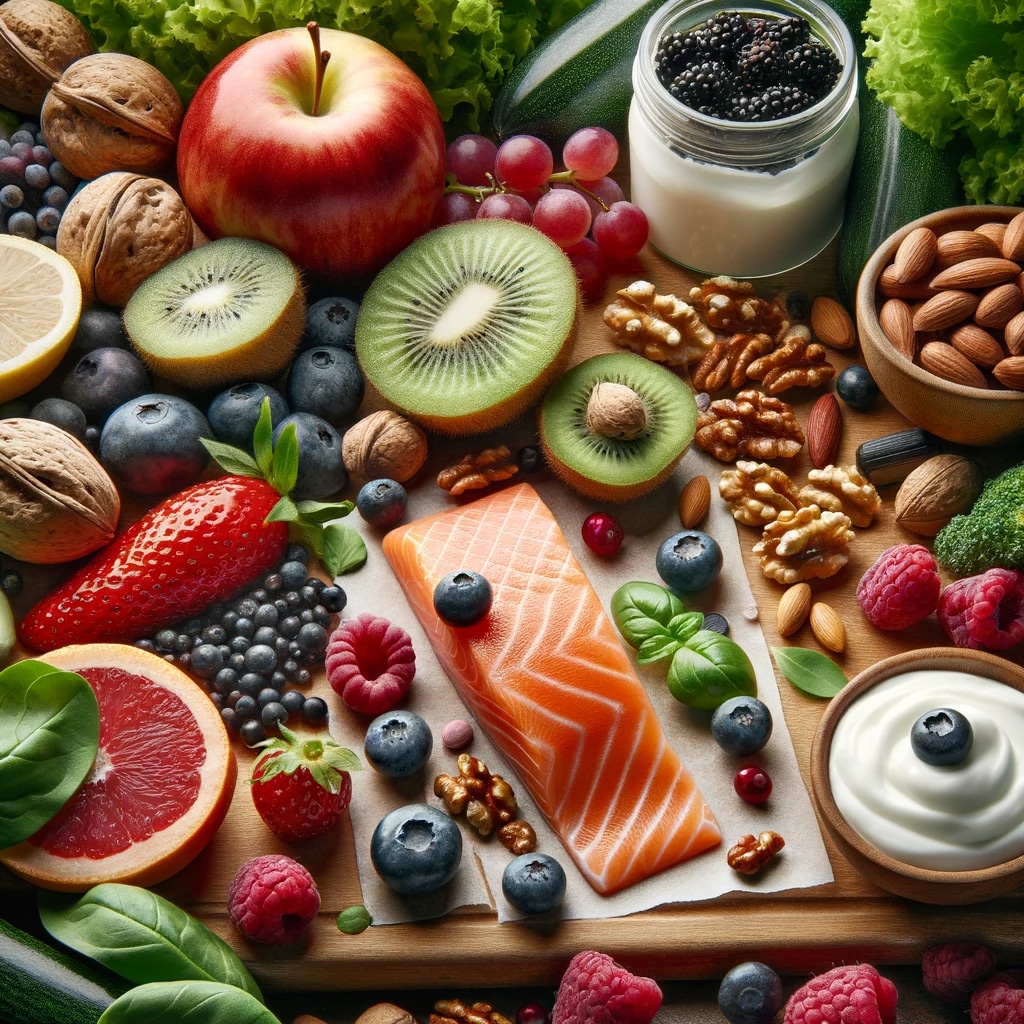- 1. Berries: Vitamin C Champions for Gum Strength
- 2. Dark, Leafy Greens: The Oral Health Multitaskers
- 3. Salmon: A Sea of Benefits for Teeth and Gums
- 4. Yogurt: Calcium-Rich for Strong Gums and Teeth
- 5. Nuts: Crunchy Allies for Gum Health
- 6. Harnessing the Antioxidant Power of Berries for Gum Health
- 7. Superfoods That Supercharge Senior Oral Health: Your FAQs Answered
In the golden years of life, maintaining a vibrant and healthy lifestyle becomes more significant than ever, especially when it comes to oral health. As we age, our dietary needs evolve, and the importance of selecting the right foods to nourish our bodies and keep our smiles shining brightly becomes paramount. This is where the concept of superfoods enters the spotlight, offering a beacon of nutritional excellence that can specifically target and enhance senior oral health.
These foods aren’t just ordinary; they’re packed with an extraordinary array of vitamins, minerals, antioxidants, and other essential nutrients that work in harmony to bolster gum health, strengthen teeth, and fight against oral diseases.
Berries: Vitamin C Champions for Gum Strength
Berries are nature’s candy, rich in vitamin C, an antioxidant critical for strengthening the connective tissues in your gums and combating gum disease. This benefit is especially valuable for seniors, as gum health is a key factor in maintaining overall oral health and preventing related diseases.
- Integrating Berries into Your Diet: Enjoying berries is as simple as snacking on them fresh, blending them into a nutritious smoothie, or mixing them into salads or yogurt. Their versatility and delicious taste make it easy to incorporate them into daily meals, offering a significant boost to gum health through their high vitamin C content. For seniors, integrating berries into daily meals can be a delicious strategy to enhance gum health, providing a natural defense against gum diseases like gingivitis and periodontitis.
Dark, Leafy Greens: The Oral Health Multitaskers
Dark, leafy greens are not just for salads; they’re a powerhouse of nutrients beneficial for gum and oral health. They’re abundant in vitamin C, which, as mentioned, is vital for gum strength, but they also offer vitamin A. This nutrient is key in developing healthy tooth enamel and maintaining the soft tissues of the mouth, including gums, cheeks, and salivary glands – all crucial for senior oral health.
- How to Add Leafy Greens to Your Diet: There’s a wide variety of dark, leafy greens to choose from, such as spinach, arugula, bok choy, and collard greens. Spinach can replace lettuce in salads for a nutrient boost, greens can be blended into smoothies for an easy health kick, or enjoyed as a side dish, like sautéed collard greens. For seniors, the addition of leafy greens to the diet is a simple yet effective method to support gum health, enhancing the body’s ability to fight off oral infections and diseases.
Salmon: A Sea of Benefits for Teeth and Gums
Salmon, known for its high-quality protein and vitamin B12 content, also offers phosphorus. This mineral is essential alongside calcium to form hydroxyapatite, the main structural component of bones and tooth enamel. For seniors, this means supporting the structural integrity of teeth and jaws, critical for gum health. Additionally, the omega-3 fatty acids in salmon contribute to overall heart health and reduce the risk of heart disease and stroke.
- How to Incorporate Salmon: Salmon is a versatile protein that can be grilled, made into a sandwich, or served atop a leafy green salad. Its rich flavor and health benefits make it an excellent choice for seniors looking to enhance their gum health through diet. Its benefits extend beyond oral health, contributing to improved heart health and potentially lowering the risk of Alzheimer’s disease.
Yogurt: Calcium-Rich for Strong Gums and Teeth
Yogurt offers more than just a creamy texture and tangy flavor; it’s a source of protein and, in some cases, probiotics that aid digestion. Importantly for oral health, yogurt is rich in calcium, essential for strong bones and teeth, thereby supporting the foundations of healthy gums.
- Ways to Enjoy Yogurt: Beyond its role as a snack or breakfast component, yogurt can serve as a healthier, lower-fat alternative to sour cream in recipes. Whether in desserts, dips, or dressings, yogurt adds a nutritious twist to everyday meals, supporting both oral and overall health. Seniors should opt for low-sugar varieties to maximize health benefits without increasing the risk of cavities. Incorporating yogurt into the daily diet can help maintain the balance of beneficial bacteria in the mouth, supporting healthy gums and teeth.
Nuts: Crunchy Allies for Gum Health
Nuts are not just a satisfying snack; they’re a boon for your smile. Rich in calcium and phosphorus, nuts help protect and rebuild tooth enamel, which in turn supports healthy gums. They also offer protein and fiber, rounding out their profile as a superfood for seniors.
- Adding Nuts to Your Diet: Nuts can enhance a variety of dishes, from parfaits combining berries and yogurt to adding a satisfying crunch to salads. Their versatility and health benefits make nuts an invaluable addition to a senior’s diet for improving gum health. For seniors, eating nuts can be an easy and effective way to contribute to the strength and health of gums, as well as providing general health benefits.
| Superfood | Key Nutrient | Benefits for Oral Health |
|---|---|---|
| Berries | Vitamin C | Strengthens gum tissue, reduces inflammation |
| Leafy Greens | Vitamins A & C | Enhances mucous membranes, promotes saliva production |
| Salmon | Omega-3 Fatty Acids | Reduces gum inflammation, lowers risk of periodontal disease |
| Yogurt | Calcium & Probiotics | Strengthens bones and teeth, balances oral microbiome |
| Nuts | Calcium & Phosphorus | Repairs tooth enamel, supports bone health around gums |
Harnessing the Antioxidant Power of Berries for Gum Health
The Vitamin C Crusade for Gums: Berries are not just delightful but are packed with vitamin C, an essential antioxidant for fighting gum inflammation and bolstering gum health. Studies, including those published in the Journal of Periodontology, have consistently highlighted the link between high vitamin C intake and a decreased risk of periodontal disease. Personal accounts from individuals who have increased their berry intake often report less gum bleeding and healthier gums overall, emphasizing the real-life benefits of this nutrient-rich superfood. Incorporating a variety of berries into your diet can be a delicious and effective way to engage in The Vitamin C Crusade for Gums, ensuring your oral health is fortified against disease and inflammation.
The Mighty Greens for Gum Protection
The Green Guard Method: Leafy greens stand as a testament to the phrase “nature’s multivitamin,” especially concerning oral health. Rich in vitamins A and C, they offer a two-pronged approach to maintaining healthy gums and preventing disease. The protective qualities of these vitamins, from enhancing mucous membranes to promoting healthy saliva production, are pivotal for senior oral health. The Green Guard Method involves integrating these nutrient powerhouses into daily meals to not only safeguard gum health but also contribute to overall bodily well-being. Stories from dental professionals about the positive impact of leafy greens on patients’ oral health further underscore the effectiveness of this approach.
Embracing Omega-3s for Inflammation Reduction
The Omega-3 Wave of Wellness: The role of omega-3 fatty acids in reducing inflammation is well-documented, including its significant benefits for gum health. Research, such as that published in the Journal of Dental Research, reveals that regular consumption of omega-3 fatty acids is associated with a notably lower risk of periodontal disease. This Omega-3 Wave of Wellness emphasizes the importance of including omega-3-rich foods in your diet, such as fish, flaxseeds, and walnuts, to combat gum inflammation and enhance overall oral health. Anecdotal evidence from individuals who have experienced reduced gum issues after adding omega-3 supplements to their diet further validates the anti-inflammatory power of these fatty acids.
Each of these strategies—The Vitamin C Crusade for Gums, The Green Guard Method, and The Omega-3 Wave of Wellness—highlights the critical role that diet plays in maintaining oral health, particularly for seniors. By adopting these nutritional practices, seniors can actively improve their gum health, showcasing the profound impact of nutrition on oral and overall health.
Superfoods That Supercharge Senior Oral Health: Your FAQs Answered
What makes superfoods so important for senior oral health?
Superfoods are dense in nutrients vital for maintaining and enhancing oral health, such as vitamins, minerals, and antioxidants, which help fight inflammation and strengthen the tissues in the mouth.
Can berries really improve my gum health?
Yes, berries are rich in vitamin C, which is essential for gum health. It helps strengthen the connective tissue in your gums, reducing the risk of periodontal diseases.
How do leafy greens benefit my teeth and gums?
Leafy greens are loaded with vitamins A and C, which support gum health by promoting saliva production and enhancing the mucous membranes in your mouth.
Is salmon good for my oral health?
Absolutely. Salmon is high in omega-3 fatty acids, which are known to reduce inflammation, including in your gums, potentially lowering the risk of gum diseases.
How does yogurt contribute to oral health?
Yogurt is a great source of calcium and probiotics. Calcium strengthens your teeth and jawbone, while probiotics help balance the bacteria in your mouth, promoting a healthy oral microbiome.
Should I include nuts in my diet for better oral health?
Yes, nuts contain calcium and phosphorus, essential minerals that help repair tooth enamel and support overall bone health, benefiting your gums and teeth.
How often should I eat these superfoods for the best results?
Incorporating these superfoods into your daily diet can offer the best benefits for your oral health, but even a few times a week can make a significant difference.
Are there any superfoods that are particularly good for preventing gum disease?
Foods rich in omega-3 fatty acids, like salmon, as well as those high in vitamin C, such as berries and leafy greens, are particularly effective at preventing gum disease.
Can superfoods replace my oral hygiene routine?
While superfoods significantly benefit oral health, they should complement regular oral hygiene practices, not replace them. Brushing, flossing, and regular dental check-ups are still essential.
Where can I find more information about diet and oral health?
For more detailed information, consult with a healthcare professional or a dentist who can provide personalized advice based on your health needs and conditions. Additionally, reputable health websites and nutritional guides can offer valuable insights into the best foods for oral health.
Citations
- “Diet, Nutrition, and Oral Health in Older Adults: A Review of the Literature” by Alice Kit Ying Chan, Yiu Cheung Tsang, Chloe Meng Jiang, Katherine Chiu Man Leung, Edward Chin Man Lo and Chun Hung Chu. This study provides an evidence-based summary of the relationship between diet and nutrition and oral health in older adults and its implications.
- “Oral health and healthy ageing: a scoping review” by Prakash Poudel, Grish Paudel, Reecha Acharya, Ajesh George, Wenche S. Borgnakke & Lal B. Rawal. This review discusses the status of oral health care for older people globally.
- “Older people’s experiences of oral health and assisted daily oral care in short-term facilities” by Susanne Koistinen, Katri Ståhlnacke, Lena Olai, Anna Ehrenberg & Eva Carlsson. This research explores the experiences of older people regarding their oral health and daily oral care in short-term facilities.
- “Protein Intake and Oral Health in Older Adults—A Narrative Review” by Thilini N. Jayasinghe. This narrative review presents the theoretical evidence on the impact of dietary protein and amino acid composition on oral health, and their combined impact on overall health in older adults.





